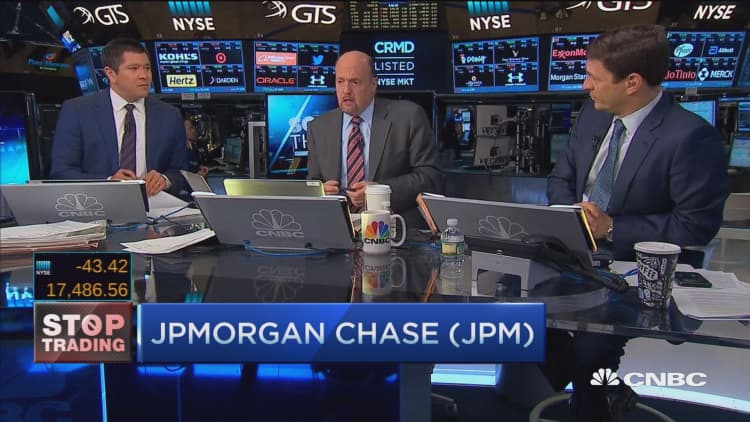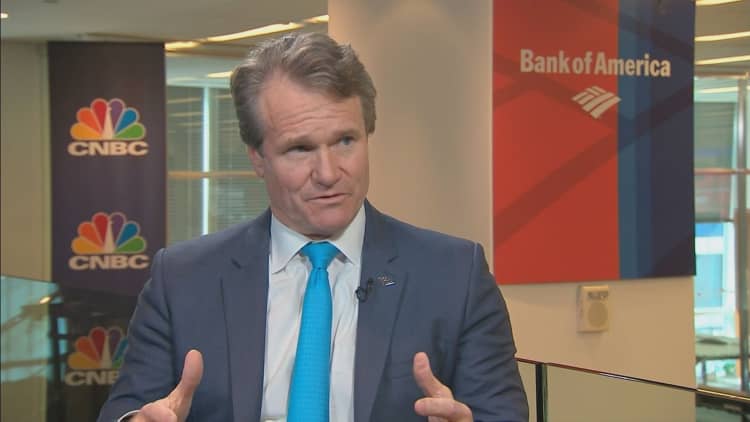
A slim minority of Wall Street bank stockholders may be mad as hell, but it looks as if most are still prepared to take it.
That's the takeaway from banks' annual investor meetings in 2016, where proposals to strengthen clawback provisions and curb golden parachutes went unheeded, as shareholders signed off on management-endorsed votes including executive pay. Despite Wall Street banks' underperformance compared to investing benchmarks in 2016, their investors are buying into executives' plans to boost returns in what has been a turbulent market.
JPMorgan Chase's annual meeting went so smoothly that nary a shareholder even approached the microphone during the gathering Tuesday in New Orleans to press CEO Jamie Dimon for details on his plans for the bank. Shareholders may have been busy counting their blessings (or returns) after the bank increased its dividend to 48 cents a share.
Proposals that put pressure on JPMorgan executives were roundly rejected, including splitting the CEO and chairman role, and a pay clawback amendment. An attempt by an AFL-CIO representative to exclude golden parachutes for directors who quit before their terms expire and pursue government service failed; and a measure to break up the bank fell short by an enormous margin, earning 3 percent of shareholders' support. But pay packages were OK'd.
Public Citizen financial analyst Bart Naylor sought to separate the CEO and chairman roles which Dimon has occupied since Dec. 31, 2006.
"It's an inherent conflict," Naylor said at the bank's meeting. "It makes no sense at all."
Read More
Shareholders didn't agree; it is worth noting that at other banks, including Bank of America, stockholders have supported similar measures to allow the same executive to have the CEO and chairman title.
Further north, in New York, Morgan Stanley executives had to field pointed questions Tuesday from one analyst — Mike Mayo of CLSA, who has challenged executives at numerous Wall Street firms for vague goals and lingering inability to meet return-on-equity targets. However, bank executives also got their measures approved, with flying colors.

The banks' success with investors, regardless of performance this year, is a strong sign of support for big banks at a key moment. The year began with some analysts questioning whether investors would seek to break up banks. Most large U.S. bank stocks are down in the high-single to low-double-digit percentage range in 2016, held against an S&P 500 that is roughly flat.
Read MoreBank of America's not giving up HB2 fight: CEO
Goldman Sachs is to host its shareholder meeting Friday. Wells Fargo investors rejected measures at its annual meeting last month that would have called for an independent chairman and that sought details of its lobbying activities, but signed off on executive compensation measures.
At Bank of America's annual shareholder meeting in April, all of its directors up for election were approved by a wide margin, and clawback proposals were defeated. Citigroup, too, saw shareholders sign off on executive pay measures and kill a breakup study proposal.
Mayo, speaking after the Morgan Stanley meeting, noted that other bank shareholders have not been as friendly as some of Wall Street's biggest firms have enjoyed. He pointed to the contentious Comerica annual shareholder meeting in late April, where investors stepped up pressure on the bank to consider selling itself.
"I think that the investor world is evolving to more active engagement," he said.
Correcton: Wells Fargo held its annual shareholder meeting in April. An earlier version misstated the timing.


